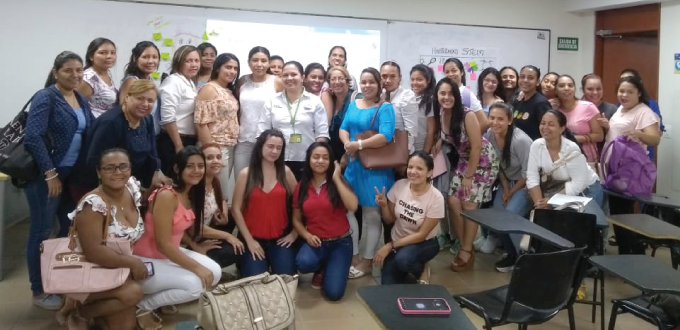A Lab to Promote Interest in Mathematics and Information Technologies
30/07/2019

With the support of LACNIC’s FRIDA Program, the project titled Mobile Lab for Developing Science, Technology, Engineering and Math (STEM) Skills has enriched the work of Colombian teachers by training them in programming languages and robotics.
Last year, this initiative of Universidad del Magdalena (Colombia) received a FRIDA grant to increase early exposure of young girls to technology by training preschool teachers.
Lucia Yesenia Bustamante, a teacher at the university and one of the promoters of the initiative, observed that training preschool teachers in these areas allows them to transfer their learning to children in a more creative and dynamic way.
How did you come up with the idea for a Mobile Lab for Developing STEM Skills?
The idea was born from the need to empower a greater number of women in STEM. We focused mainly on teachers working in initial and preschool education, as these are typically women who did not choose a career in STEM but who, after receiving training, might bring to their classroom topics and activities for the promotion of these areas.
In addition to enriching their work, we believe that by training preschool teachers to develop these skills they will be able to support children’s development and learning in an active, creative and dynamic way by creating with technology.
What exactly is the mobile lab?
The mobile lab consists of STEM kits for children aged 4 to 7 years. Each kit includes a tablet with the ScratchJr computer programming language, a set of ScratchJr programming blocks created in fomi, a Cubeto coding kit, and an interactive story where children must code to advance through different screens.
The teachers completed five modules (team-based learning, computational thinking, simple machines, educational robotics) and then developed projects for their classrooms. This training allowed them to create educational resources using ScratchJr and design classroom projects starting at preschool level. The goal is to encourage the development of STEM skills such as algorithmic thinking by programming robots designed for children and to familiarize children with physical and mathematical concepts as they build and play with simple machines.
Working in groups of three or five, project participants were able to design classroom projects for children aged 4 to 7 years. Right now, we are in the process of validating these classroom projects through week-long STEM camps for children from different educational institutions. In August, these projects will be implemented in various institutions in the district of Santa Marta and the department of Magdalena.

After touring the preschools of the department of Magdalena, what results would you say that the mobile lab has achieved?
One of the main results is that by coding with ScratchJr, using STEM stories and educational robotics we are encouraging an interest in careers in technology among girls and boys of different preschools, and awakening their curiosity for creating with technology.
Another result worth highlighting is that 35 teachers currently working in the transition grade (5-year-olds) and 30 students or teachers completing their education were trained in different aspects related to STEM fields based on the STEM diploma. The theoretical and practical modules also allowed reinforcing the pedagogical practices of these teachers, which in turn has sparked the interest of those responsible for education in the incorporation and effective use of technology in preschool classrooms.
Why did you focus on preschool education?
Because at this stage children are laying the groundwork that will help them develop their various skills and potentials. In preschool, they are able to acquire knowledge more easily, which means that it will be much easier for them to understand concepts and content related to science, mathematics and technologies in the following stages of their education. In addition, it is important to begin familiarizing children and motivating them to pursue STEM careers while they are in preschool by helping them create meaningful products that will have a place in their lives so that, in the future, they will already be familiar with the terms associated with physics, mathematics, coding and others. We also hope that this will have an impact in encouraging children to pursue careers in technology and science.
How did you find your participation in FRIDA and what would you say are the main lessons you learned from this process?
FRIDA’s support has been very positive, as the program provided us the resources we needed to acquire important tools that helped us work towards the goals we set out for the project, which we hope will help to improve the statistics that have to do with the empowerment of women in STEM. We would like to stress the commitment of the program in each process and phase of the project: FRIDA allowed us to execute the phases autonomously and accompanied and offered us their support when necessary.